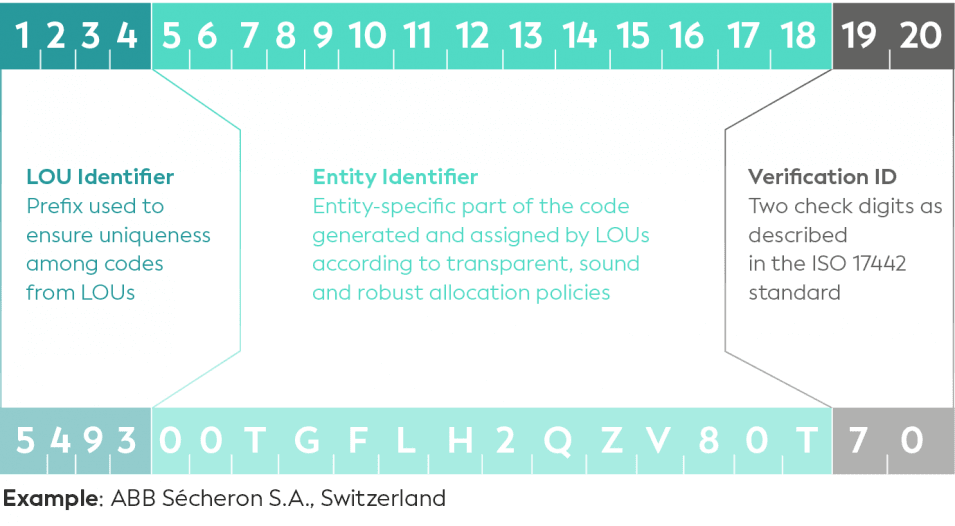Do companies need an LEI code for Danske Bank, Nordea or other banks? Read more about LEI codes in banking here.
Learn more about using LEI codes in relation to the banking world
Due to the creation of the global LEI system, it is now possible to uniquely identify all companies and other legal entities participating in financial transactions.
All LEI codes can be accessed in a register on GLEIF's website. The database is open and searchable for everyone, and you can look up any LEI code and know exactly which company you are dealing with.

There are four basic organizational concepts that you should know to understand the global LEI system.
GLEIF stands for 'Global Legal Entity Identifier Foundation' and is the organization behind the LEI system. It was founded in 2014 and was tasked with implementing a global system that could be used to identify the movements of legal entities in the financial markets.
GLEIF is a non-profit organization and headquartered in Basel, Switzerland. GLEIF is behind the global database where all LEI codes can be searched by the public. GLEIF's index is the only official database that offers an open and standardized index for the identification of legal entities that have an LEI code.
GLEIF themselves formulate their vision on their website in the following way:
"The Global Legal Entity Identifier Foundation (GLEIF) enables smarter, less costly and more reliable decisions about who to do business with."
GLEIF's database is updated once a day. If you register and receive your LEI code today, it will be visible on GLEIF's website tomorrow at 15:00.
GLEIF is regulated by LEI ROC, which stands for Regulatory Oversight Committee. LEI ROC consists of a group of public authorities from around the world. Their task is to check that GLEIF follows the guidelines and principles established for the system as a whole.
LEI ROC was founded in January 2013. You can read more about their work on their website www.leiroc.org.
Local Operating Units (LOUs) are so-called issuing organizations and operate under GLEIF. The LOUs must be certified by GLEIF to be allowed to issue LEI codes, and meet certain standards in relation to quality and service. GLEIF determines how suitable the organization is to operate within the LEI system.
If you wish to become an LOU, you must go through a targeted program at GLEIF to be accredited as an LEI issuer.
The LOUs' task is to register, update and renew LEI codes in GLEIF's database. They act as the primary organization for all legal entities required to have an LEI code. The LOUs are continuously quality-checked using data reports which are delivered to GLEIF. Among other things, this ensures that the quality of the data processing meets the standard.
The LOUs cooperate with LEI registration agents. This is the category to which Global Finreg belongs.
You typically contact a registration agent if you want to buy an LEI code. The registration agents help all legal entities, such as companies, enterprises, foundations, endowments, etc., to apply for LEI codes - as well as to maintain and renew them.
The most important role of the registration agents is to ensure that the companies' wishes are met by the LOUs, as well as to make the process as simple and accurate as possible for the legal entities. This is done by ensuring a good and user-friendly platform, facilitating secure payment, and providing clear communication and good customer service, as well as helping to validate all necessary information in order to create a new LEI.

In order to ensure that the LEI system always meets the users' requirements and continues to develop, GLEIF has assembled stakeholders from various market segments who contribute information from the market.
The LEI system is based on the ISO 17442 standard, with four underlying key principles:
· It is a global standard.
· Each legal entity can be assigned a maximum of one unique identification code.
· The code is supported by high-quality data.
· The system is open to the public and accessible to all, and free to use.

The ISO 17442 standard also states which type of data must appear as a minimum from the LEI code. You can read more in our article, 'What is an LEI code'. In the article, you can also find information about the 20-digit code that constitutes part of this standard.
To ensure that the company’s data is always up to date, an LEI code must be renewed once a year, where all data is updated or confirmed. This means that even if you order a 5-year validity period on an LEI code via a registration agent, it will still appear in GLEIF's database that your LEI code expires within 1 year.
All registration agents are obligated to update your company data when your LEI code is renewed once a year.
At Global FinReg, we have decided to do continuous updating throughout your LEI validity period. This way, you know that your company data is always correctly registered in the global database at GLEIF. This eliminates the risk of delays in your financial transactions, e.g., due to a name change of the legal entity.
You can read more about the importance of accurate LEI code data here.
If you need help or have any questions, please contact our customer services team.
Learn more about using LEI codes in relation to the banking world
Why do LEI codes need to be renewed - and how to do it?
An Entity Map provides a visual overview of your organization by using LEI codes only.
We are here to help you!